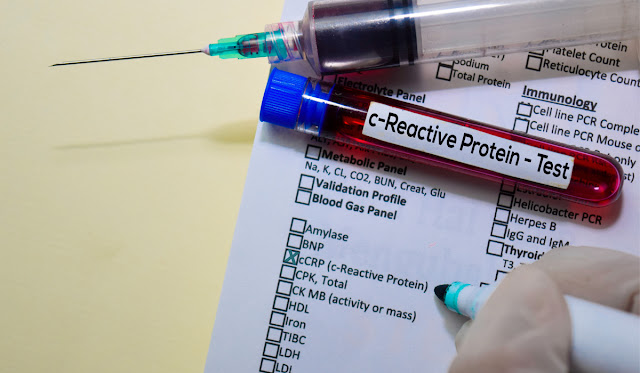 |
| CRP (C-reactive protein) Test |
Blood tests help identify underlying conditions whose symptoms are presented by the body. They also help decode the diseases a person may be suffering from and genetic conditions if any.
What is CRP test?
C-reactive protein test is a blood test that helps diagnose reasons for inflammation in the body. This protein is produced by the liver and the levels rise up by thousands in case of a disease or threat to the body thereby helping in monitoring the progression of the sickness.
This protein is termed “Acute Phase Reactant” – which means C-reactive protein concentration increases or decreases in case the body is undergoing conditions such as trauma or acute tissue inflammation. It is released into the blood within a few hours after there is inflammation, injury or infection in the body. CRP levels may also be high soon after a surgery, a heart attack, or in case of sepsis.
Private blood test centres and other authorised medical centres such as https://www.broadwaypharmacy.co.uk/ can do this blood test for you and let you know if your C-reactive protein range is within normal.
Normal CRP levels in an average UK citizen without any health condition is less than 3 mg/L and can range up to 10 mg/L. High CRP levels are considered to be anything above 10 mg/L.
C-reactive protein high symptoms
The following
symptoms may indicate a high CRP level in your blood:
· Tiredness or exhaustion without reason
· Body aches and pains
· Chills and fever
· Headache
· Loss of sleep
· Loss of appetite
· Weight loss
C-reactive protein treatment
High CRP levels
usually subside once the infection or injury has been controlled. It’s not so
much the protein itself, but the underlying condition has to be treated to
lower the levels. Doctors may prescribe a number of medicines to lower the
cholesterol levels or treat the cause of inflammation. However, making
adjustments to your lifestyle such as giving up smoking, losing weight, taking
up aerobic exercises, and adapting to a healthier non-sedative lifestyle can
help naturally reduce CRP levels.
Comments
Post a Comment